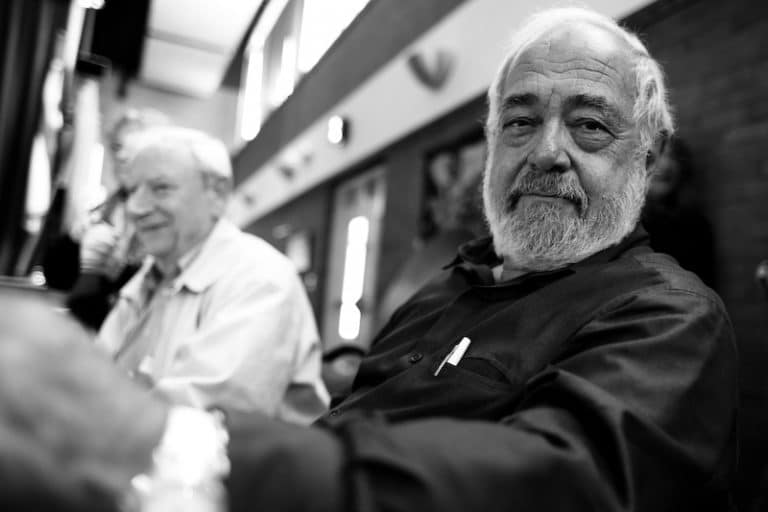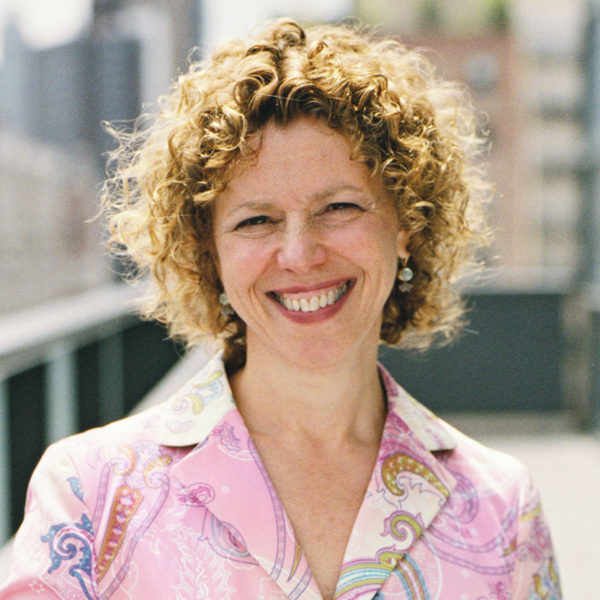
The Holocaust Survivors Group at Cafe Europa in 2007 hosted by Jewish Family Services of New Jersey. Image by Zach Wise/Flickr, Some Rights Reserved.
A Marathon of Survival: Hidden Love and Honoring a Protector
On the morning of the New York City marathon, crowds of fans cheer runners across the finish line. A few blocks away, a small group of elderly Jews gathers at my apartment to revisit their own marathon of survival and to honor the memory of an illiterate Polish peasant woman to whom they owe their lives.
My father Arnold, 89, and his sister, my aunt Marilyn, 80, drive in from New Jersey with my mother Regina, 82, and my uncle. Gloria, 72, and her husband take the train from Long Island. Everyone arrives early, eager to make the most of their time together. Initial greetings feel formal but coffee and bagels ease the conversation of people who last convened more than 25 years ago.
Blonde-haired and blue-eyed Arnold was born in Warsaw, but in 1939 moved northeast to Wengrow, a small city with a very old Jewish community. where his family owned and operated a flour mill. As the Nazis closed in on Poland, rumors about Treblinka, only 14 miles away, filtered back to Wengrow. By 1942 the city’s Jews were herded into a ghetto certain that death awaited them. There was no place to run. Jews desperately tried to procure falsified gentile identity papers, hide in cellars or run into the forest. Arnold’s mother and his 11-year-old sister, Marilyn were too visibly Semitic-looking and vulnerable to attempt any such escape. He approached Mrs. Kowalczyk, a kindly peasant woman who lived outside of town near the flourmill.

She agreed to take my grandmother and aunt for a little while. Mrs. Kowalczyk would put them in the barn behind the hay. No one ever imagined that the war would last over two years. Her husband could not know anything at all. Being caught hiding Jews meant certain death and Mr. Kowalczyk, an alcoholic who worked as a custodian in a local leather business, was not trustworthy. The Kowalczyk’s only child, Stenka, on the other hand, a beautiful young woman with a loose reputation, was in on the secret from the beginning. She helped bring pots of food to the secret lodgers and take out their waste. Stenka’s romance with the local German police officer helped distract unwanted attention.
Around the same time, Gloria’s father, the owner of the leather business, pleaded with the Kowalcyzks to shelter their three-year-old daughter. The family had two sons in their early teens, but no one would hide circumcised boys.
Regina, born and raised in Wengrow, chimes in to the brunch conversation. My ears register a difference in my mother’s usually serious voice. I hear lightness, an unfamiliar bubbling of joy:
“I remember when you were born, Gloria. My mother was best friends with your mother and we came to visit. I was 10 and I played with your brothers. Everyone was so excited to have a little girl, a princess!”
Frayed, sepia-toned picture postcards of Gloria’s brothers retrieved from albums sent to relatives in New York and Israel before the war, pass tenderly from hand to hand.

In the late autumn of 1942, Gloria’s brothers, along with the rest of the family, were gassed in Treblinka. My mother jumped from a transport truck en route to the death camp, fled into the forest, and survived under a forged alias as a maid in Warsaw. Until the Russians liberated Poland’s capital in 1944, she had no idea if any Jews remained alive in Europe.
Regina continues with a bittersweet lilt, “Your mother had such a beautiful voice. I remember her always singing to you.”
Gloria nods. She barely remembers the mother who sang lullabies and put white ribbons in her dark curls. She doesn’t have such clear memories either of Mrs. Kowalczyk, whom she called “Matka,” the Polish diminutive for mother. One vivid image is the night, German officers, suspicious of the little girl’s alibi as Stenka’s illegitimate daughter, awakened Gloria demanding that she recite her bedtime prayers. Mrs. Kowalcyzk had prepared her well. The toddler fell to her knees intoning Catholic liturgy in perfect Polish.
In 1945, Gloria’s Bronx aunt located the little girl and started the process of bringing her to the United States. Poland was in chaos, waves of dislocated children and adults flooding refugee channels:
“One day, a lady came and told me we were going for a visit. That was it. I never saw my Matka again.”

Gloria was five years old. She spent her sixth birthday in a Lutheran orphanage in Sweden. A year later immigration officials sent her to Canada where a few weeks of visa bureaucracy turned into three years in a foster home. Gloria arrived in the Bronx at age 10, dislocated and confused.
My aunt Marilyn, quiet until now, starts to talk, “They loved you so much. Mrs. Kowalczyk had letters written to us pleading that we should find you and tell her what happened to you.”
Marilyn and her mother lived behind the haystack until winter set in and little Gloria discovered their feet sticking out through the straw. She ran screaming to her Matka, “There are Jews in the barn.”
That night, Mrs. Kowalczyk moved the two shivering Jews to the attic where they crouched in the dark for two more years. Marilyn, not yet in her teens, spent the daylight hours peering enviously through a peephole at the little girl playing below.
My parents married in the United States and moved to a farm in the Catskills where I was raised. Rural life was hard, but my family never forgot their debt to the Kowalczyks. They sent stockings, bolts of cloth, and antibiotics for Stenka who was sick with tuberculosis. And always the same question came back:
“How is our baby? Is she well, is she happy?”
The family located Gloria in the early 1950s and visited her in the Bronx. She was a pale, fearful girl. Her aunt sternly warned the visitors against bringing up traumatic topics. Her visitors wrote back to Mrs. Kowalczyk that Gloria was healthy, going to school, and thriving. Their next contact was 20 years later. Gloria, a young married woman busy with small children had no room for ghosts.
The family met Gloria again a few years later. Mr. Kowalczyk, Stenka, and my grandmother were dead. Gloria, a professional teacher, had become a Holocaust educator. Her children were grown. She seriously pondered getting in touch with her rescuer but feared that the shock might be too great for the elderly woman. Mrs. Kowalczyk died.
Afternoon clouds darken the day’s autumnal brilliance. The stream of runners in Central Park thins. Gloria shakes her head, catching the light in her silvered white curls. Her voice is thick with sadness:
“I have so much regret. If I could change one thing, I would have gone back to visit her. Everyone kept pushing me to move on, not to dwell on the past. I couldn’t disobey, I had to be polite. Mrs. Kowalczyk gave me life. I will go to my grave begging Matka’s forgiveness.”
The room is still. My parents and my aunt are the only people alive who bear witness to the true story of the little girl dancing in the yard. The tapestry of their memories softens Gloria’s sorrow and parts the heavy shadow of criticism she has carried for a lifetime. The Wengrow reunion prepares to disband. As they put on coats and say their goodbyes, they make promises to get together soon.


